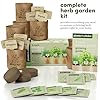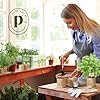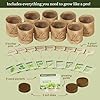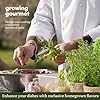Brightpeak 8 FT Outdoor Wooden Raised Garden Bed, Elevated Planting Planter Box Kit for Flowers/Vegetables/Patio/Outdoor, Natural
$45.98 (as of 14:48 GMT -05:00 - More infoProduct prices and availability are accurate as of the date/time indicated and are subject to change. Any price and availability information displayed on [relevant Amazon Site(s), as applicable] at the time of purchase will apply to the purchase of this product.)1MORE Galvanized Raised Garden Bed- Planter Garden Boxes Outdoor, Raised Beds for Gardening, 4x2x1ft Metal Garden Bed Kit for Vegetables Flower, Planter Raised Beds with Tools.Silver-2pack
$49.99 (as of 14:26 GMT -05:00 - More infoProduct prices and availability are accurate as of the date/time indicated and are subject to change. Any price and availability information displayed on [relevant Amazon Site(s), as applicable] at the time of purchase will apply to the purchase of this product.)Are you ready to start composting at home? Composting is a great way to reduce waste and create nutrient-rich soil for your garden. In this beginner’s guide, we will cover everything you need to know to get started with composting.
What Is Composting and Why Should You Start?
Composting is the process of breaking down organic matter into a rich, nutritious soil amendment that can be used in your garden. It’s an eco-friendly way to dispose of food scraps and yard waste while also creating a valuable resource for your plants. By composting, you can reduce the amount of garbage that ends up in landfills, which helps to reduce greenhouse gas emissions and preserve valuable landfill space.
The Basics of Starting Your Own Compost Pile
To start composting at home, you will need a few basic materials:
A compost bin or pile: You can buy a pre-made compost bin or make your own using pallets or chicken wire. Alternatively, you can create a simple pile on the ground.
Brown material (carbon): This includes dried leaves, shredded paper, sawdust, or straw. These materials provide the carbon needed to balance out the nitrogen in your compost pile.
Green material (nitrogen): This includes fresh grass clippings, fruit and vegetable scraps, coffee grounds, and eggshells. These materials provide the nitrogen needed to heat up your compost pile.
Once you have these materials, it’s time to build your compost pile. Here are some tips for getting started:
1. Choose a location for your compost pile that is easily accessible but not too close to your house. Ideally, it should be located in a sunny spot where it can receive plenty of airflow.
2. Create a layered structure in your compost pile by alternating brown and green materials. Start with a layer of browns, followed by a layer of greens, and continue until you reach the top of your pile.
3. Water your compost pile regularly to keep it moist but not soggy.
4. Turn your compost pile periodically to aerate it and mix up the ingredients. This helps to speed up the decomposition process.
Tips for Maintaining a Healthy Compost Pile
Here are some tips for maintaining a healthy compost pile:
1. Keep your compost pile balanced by adding equal parts brown and green materials.
2. Add new materials to your compost pile as soon as possible after collecting them to ensure they don’t become contaminated with pathogens.
3. Use a variety of materials in your compost pile to promote diversity and encourage beneficial microorganisms.
4. Monitor the temperature of your compost pile to ensure it stays within the ideal range of 130-150°F. If it gets too hot, turn your pile more frequently to cool it off.
Troubleshooting Common Composting Problems
Even experienced composters sometimes run into problems when trying to create perfect compost. Here are some common issues and how to address them:
1. Not enough airflow – if your compost pile doesn’t have enough airflow, it may become smelly or attract rodents. To fix this problem, turn your pile more frequently or add more brown materials to increase airspace.
2. Too much water – if your compost pile is overly wet, it may develop mold or fungus. To correct this issue, turn your pile more frequently to aerate it or add more dry materials like shredded paper or straw.
3. Not enough nitrogen – if your compost pile isn’t generating enough heat, it may be lacking in nitrogen. Try adding more green materials like fresh grass clippings or food scraps.
4. Too many critters – if your compost pile is attracting unwanted visitors like rats or flies, try covering it with a tarp or screen to exclude them.
Conclusion
Starting a home composting system is easy and rewarding. With just a little effort, you can divert tons of organic waste from landfills each year while creating valuable soil amendments for your garden. So what are you waiting for? Get started today!
Related Content
- Return of Curbside Compost Collection Is Delayed on the UWS Due to ‘Lack of Demand’
- Tri-Valley Gears Up For State Mandates on Composting | Regional/CA News | independentnews.com
- Organic Gardening Has Never Been This Easy!
- 5 Common Mistakes People Make When Starting a Vegetable Garden (and How You Can Avoid Them
- Improve Your Garden’s Overall Look With These Simple Tips!














































